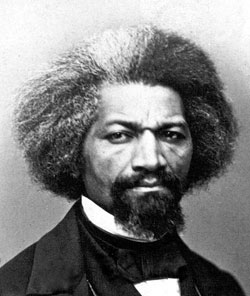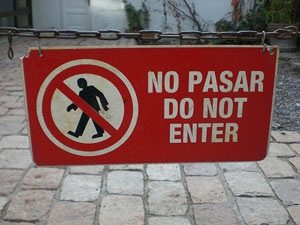
Source: You Are Here, thejcgerm, Flickr
Using context clues to figure out unknown words is a tried-and-true strategy for improving your vocabulary and understanding what you read. You may not realize this, but you have been learning new words by analyzing their context your whole life.
Imagine a two-year-old child who is just learning to speak. Does his mom or dad sit him down with a dictionary and say, “Here you go, kid. These are all the words you need to know to be able to communicate with me and the rest of the world”? Of course not! He learns by listening to the words spoken to him and comparing them to his current environment. That’s one reason why one of the earliest words we learn is “no.” It’s a word most little kids hear when they are doing something they are not supposed to. They learn from the context that “no” means that they need to stop what they are doing.
When you read, the context of a word refers to the words around it. If the word is unfamiliar, the way it is used in a sentence or paragraph can shed light on its meaning. Using your knowledge of cognates can also help you understand unfamiliar words when you read.
I was carrying a couple of boxes, so I was glad that the door opened automatically.

Source: Frederick Douglass c1860s, Wikimedia
For example, if you don’t know what the word automatically means, you can look at the words surrounding it and use your knowledge of Spanish cognates to figure it out. The writer of the sentence above says she was carrying boxes, so you might guess that she would have a difficult time opening the door. She also says that she was glad the door opened automatically. A door opening automatically must be helpful to a person carrying boxes. You may also know that the word “automatic” means “by itself” in Spanish, so from the context and from your understanding of Spanish, you can figure out that automatically means “by itself.” The door opened by itself, making it easier for the writer because she was carrying boxes and couldn’t use her hands to open the door.
Now, read a short excerpt from Frederick Douglass’s autobiography Narrative of the Life of Frederick Douglass, an American Slave. Here Douglass describes his arrival at the home of Mr. Covey, a man who proves to be a cruel master. See if you can figure out the meaning of the red words using context clues and cognates to help you.
It was never too hot or too cold: it could never rain, blow, hail, or snow, too hard for us to work in the field. Work, work, work, was scarcely more the order of the day than of the night. The longest days were too short for him, and the shortest nights were too long for him. I was somewhat unmanageable when I first went there, but a few months of this discipline tamed me. Mr. Covey succeeded in breaking me. I was broken in body, soul, and spirit. My natural elasticity was crushed, my intellect languished, the disposition to read departed, the cheerful spark that lingered about my eye died; the dark night of slavery closed in upon me; and behold a man transformed into a brute!
Let’s look at the first red-letter word, unmanageable. If you are unsure of the meaning of the word, you could read the sentence before it. In this case, however, there don’t seem to be any helpful clues in the previous sentence. Try looking at the prefix and suffix. You may know from previous lessons about affixes that -un means “not” and -able means “having the power to do something.” Now you know that part of the word means “not able” to do something.
Continue reading the rest of the sentence. When you do that, you discover that after a few months, Mr. Covey’s discipline tamed Douglass. If you’re unsure of the word discipline, you might use your knowledge of Spanish and think about the Spanish cognate “disciplina,” which means “control.”
The word tamed is also in red, so let’s think about it for a moment. If you now know that discipline means “control,” you know that Mr. Covey’s discipline did something to Douglass. It tamed him. Read the next sentence: “Mr. Covey succeeded in breaking me.” If you get an image in your head of a horse or an animal, you would be right, but if you didn’t, and you read it literally, you would also be right because, as you read on, Douglass tells you that he is “broken in body, soul, and spirit.”

Source: Aquæ, chrisinplymouth, Flickr
Now, let’s take everything we know and put it together with our vocabulary words. Our narrator is “broken” because he has been tamed by discipline. You might be able to think of the word “tame” in terms of an animal like a tiger or bear that is made less dangerous. Revisit the meaning of unmanageable now. You know that Mr. Covey tamed the narrator with discipline after a few months. The narrator tells us this after saying that he was unmanageable when he first arrived. Therefore, the narrator must mean that he was like a wild animal in Mr. Covey’s eyes.
Now, using context clues and cognates, see if you can figure out the meanings of the remaining red words in the excerpt. Use your notes to write each word’s meaning. When you are finished, check your understanding for possible responses.
Natural: True to nature
Elasticity: The quality of being able to adapt or change
Languished: To become weakened; dispirited
Disposition: Mood or temperament
Transformed: Changed in character or condition
Brute: An animal
It takes time and patience to figure out the meanings of unfamiliar words, but if you spend the time and have the patience, you will be rewarded with an ability to figure out unfamiliar words on your own and an increased vocabulary.
In the same way, if you’re reading and come across a Spanish word, you can use your knowledge of cognates to help you understand what is being said. Look at the sentence that follows. You can probably figure out what the sentence means just by picking out the cognates.
El objetivo del actor es explorar su carácter.
Using your notes, list the words that are cognates in the sentence above. For each Spanish word, write the English cognate next to it. You should end up with five pairs of words. When you are finished, check your understanding to see possible responses.
objectivo/objective
actor/actor
es/is
explorar/explore
carácter/character
Now, look at the sentences below. What is the translation of each sentence? Use notes to write your translations. When you are finished, check your understanding to see possible responses.
La literatura Norteamericana es difícil.
El profesor de música es inteligente.
North American literature is difficult.
The music professor is intelligent.